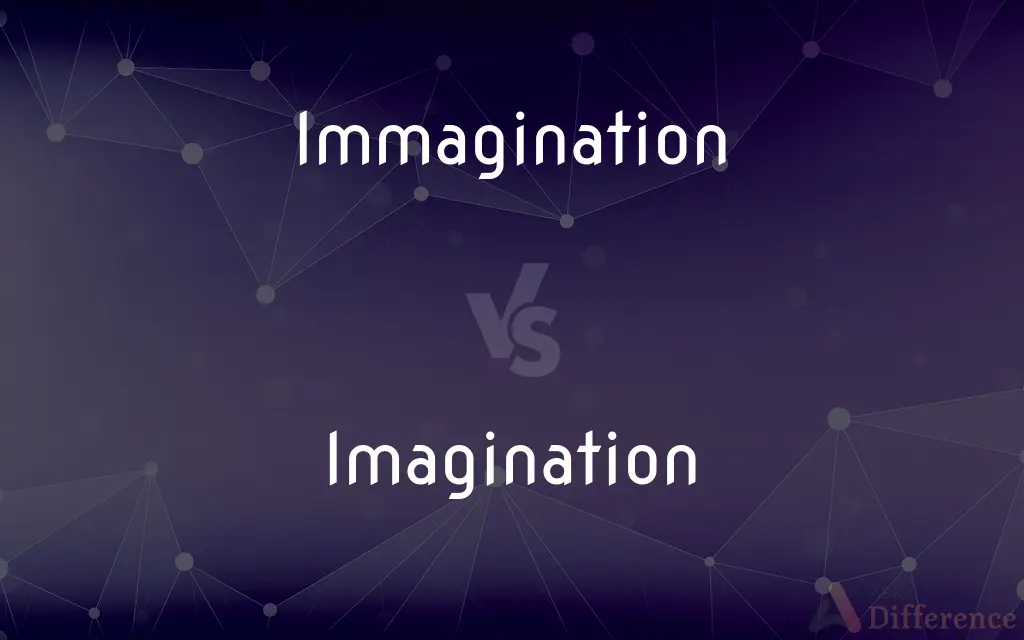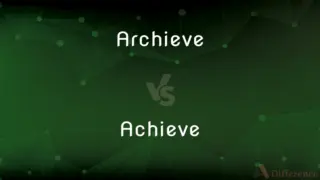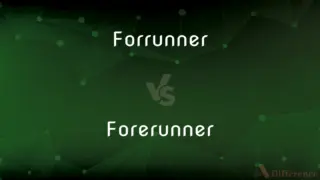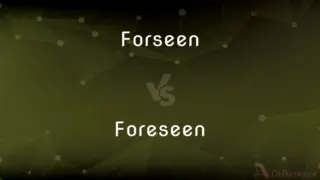Immagination vs. Imagination — Which is Correct Spelling?
By Tayyaba Rehman — Updated on April 3, 2024
"Immagination" is incorrect; the right spelling is "Imagination." Imagination refers to the ability to form new ideas or images in one's mind.

Table of Contents
Which is correct: Immagination or Imagination
How to spell Imagination?

Immagination
Incorrect Spelling

Imagination
Correct Spelling
ADVERTISEMENT
Key Differences
Remember, "image" has one 'm', so does "imagination."
Think of "I magine" - just one 'm' in "magine."
Relate it to "imagine," which also has a single 'm.'
Double consonants are less common in English; when in doubt, go for one.
Use mnemonic: "I Make A Great Idea Through Imagination" - highlighting the single 'M.'
ADVERTISEMENT
How Do You Spell Imagination Correctly?
Incorrect: His immagination created worlds of wonder.
Correct: His imagination created worlds of wonder.
Incorrect: The story was a product of pure immagination.
Correct: The story was a product of pure imagination.
Incorrect: She believed in the power of immagination.
Correct: She believed in the power of imagination.
Incorrect: He used his immagination to solve complex problems.
Correct: He used his imagination to solve complex problems.
Incorrect: Their project was a testament to human immagination.
Correct: Their project was a testament to human imagination.
Imagination Definitions
Imagination is the faculty of forming new ideas or mental images of what isn't present.
Her vivid imagination could paint worlds beyond reality.
Imagination can also denote the action of setting the mind on something.
Through sheer imagination, she envisioned a solution to the problem.
Imagination can refer to a person's capacity for creativity or original thought.
The child's drawing showed a wild imagination.
Imagination encompasses the activities associated with thinking and understanding in novel ways.
Writers often dwell in the realms of their imagination.
Imagination is the ability to confront and interpret reality inventively.
He crafted the story entirely from his imagination.
The ability to form mental images of things that are not present to the senses or not considered to be real
The author uses her imagination to create a universe parallel to our own.
The formation of such images
A child's imagination of monsters.
One of these mental images
"some secret sense ... which ... took to itself and treasured up ... her thoughts, her imaginations, her desires" (Virginia Woolf).
The mind viewed as the locus or repository of this ability or these images
"This story had been rattling around in my imagination for years" (Orson Scott Card).
The ability to confront and deal with reality by using the creative power of the mind; resourcefulness
Handled the problems with great imagination.
Attention, interest, or enthusiasm
An explorer's ordeal that caught the imagination of the public.
The image-making power of the mind; the act of mentally creating or reproducing an object not previously perceived; the ability to create such images.
Imagination is one of the most advanced human faculties.
Particularly, construction of false images; fantasizing.
You think someone's been following you? That's just your imagination.
Creativity; resourcefulness.
His imagination makes him a valuable team member.
A mental image formed by the action of the imagination as a faculty; something imagined.
The imagine-making power of the mind; the power to create or reproduce ideally an object of sense previously perceived; the power to call up mental imagines.
Our simple apprehension of corporeal objects, if present, is sense; if absent, is imagination.
Imagination is of three kinds: joined with belief of that which is to come; joined with memory of that which is past; and of things present, or as if they were present.
The representative power; the power to reconstruct or recombine the materials furnished by direct apprehension; the complex faculty usually termed the plastic or creative power; the fancy.
The imagination of common language - the productive imagination of philosophers - is nothing but the representative process plus the process to which I would give the name of the "comparative."
The power of the mind to decompose its conceptions, and to recombine the elements of them at its pleasure, is called its faculty of imagination.
The business of conception is to present us with an exact transcript of what we have felt or perceived. But we have moreover a power of modifying our conceptions, by combining the parts of different ones together, so as to form new wholes of our creation. I shall employ the word imagination to express this power.
The power to recombine the materials furnished by experience or memory, for the accomplishment of an elevated purpose; the power of conceiving and expressing the ideal.
The lunatic, the lover, and the poetAre of imagination all compact . . . The poet's eye, in a fine frenzy rolling,Doth glance from heaven to earth, from earth to heaven,And as imagination bodies forthThe forms of things unknown, the poet's penTurns them to shapes, and gives to airy nothingA local habitation and a name.
A mental image formed by the action of the imagination as a faculty; a conception; a notion.
The same power, which we should call fancy if employed on a production of a light nature, would be dignified with the title of imagination if shown on a grander scale.
The formation of a mental image of something that is not perceived as real and is not present to the senses;
Popular imagination created a world of demons
Imagination reveals what the world could be
The ability to form mental images of things or events;
He could still hear her in his imagination
The ability to deal resourcefully with unusual problems;
A man of resource
Imagination Meaning in a Sentence
With a little imagination, you can see shapes in the clouds.
The best inventions start with a spark of imagination.
Imagination is like a muscle; the more you use it, the stronger it gets.
Reading books is a great way to fuel your imagination.
The painter's imagination was evident in his colorful landscapes.
Her imagination took her on adventures far beyond her small town.
Children's imagination knows no bounds, which is why they come up with the best stories.
A blank canvas is a playground for the imagination.
Imagination can turn the mundane into the extraordinary.
The theme park was designed to capture the imagination of both young and old.
Imagination is a crucial tool for scientists and inventors.
He used his imagination to craft a world in his novel that felt almost real.
Sometimes, solving a problem requires more imagination than knowledge.
The greatest artists in history had not only skill but also a vivid imagination.
Without imagination, life would be a dull sequence of events.
They put their imagination to work to design an innovative new product.
Imagination is the bridge between the present and the future.
The teacher encouraged her students to use their imagination for the art project.
Her imagination helped her to visualize complex mathematical concepts.
With imagination, a cardboard box becomes a spaceship or a castle.
In the realm of imagination, anything is possible.
A good book can transport you to other worlds, thanks to the power of imagination.
Through imagination, we can experience the world from different perspectives.
She wrote stories that stretched the imagination to its limits.
Imagination Idioms & Phrases
A figment of one's imagination
Something that is made up in the mind and not real.
She thought she heard footsteps, but it was just a figment of her imagination.
Let your imagination run wild
Allow yourself to think creatively without limitations.
When brainstorming, it's helpful to let your imagination run wild and write down whatever comes to mind.
Common Curiosities
What is the root word of Imagination?
"Imagine."
Which vowel is used before Imagination?
Depending on the context, it could be "an" or "a."
What is the plural form of Imagination?
"Imaginations."
Which preposition is used with Imagination?
Typically, "of" or "with."
Is Imagination an abstract noun?
Yes.
Why is it called Imagination?
It's derived from Latin "imaginatio", referring to forming mental images or concepts.
What is the verb form of Imagination?
"Imagine."
Is Imagination a noun or adjective?
Noun.
What is the pronunciation of Imagination?
/ˌɪm.əˈdʒɪn.eɪ.ʃən/
Which conjunction is used with Imagination?
The conjunction would be context-dependent, but "and" could be used.
Is Imagination a negative or positive word?
Neutral, but often perceived positively.
What is the singular form of Imagination?
"Imagination."
Is Imagination an adverb?
No.
Which article is used with Imagination?
"The" or "an."
Is Imagination a countable noun?
Generally uncountable, but can be countable when referring to different kinds or instances.
Is the word “Imagination” a Direct object or an Indirect object?
It can be used as a direct object.
What is a stressed syllable in Imagination?
"mag."
What is the opposite of Imagination?
Reality.
Is Imagination a vowel or consonant?
"Imagination" is a word containing both vowels and consonants.
Is the word Imagination a Gerund?
No.
Which determiner is used with Imagination?
Depending on the context, "this," "that," "my," "your," etc.
How is Imagination used in a sentence?
"Her vivid imagination often led her to dream up fantastic worlds."
How many syllables are in Imagination?
Five.
How do we divide Imagination into syllables?
I-mag-i-na-tion.
What part of speech is Imagination?
Noun.
What is another term for Imagination?
Creativity.
What is the second form of Imagination?
N/A.
Is Imagination a collective noun?
No.
Is the Imagination term a metaphor?
No, but it can be used metaphorically.
Is the word Imagination imperative?
No.
What is the first form of Imagination?
Imagination doesn't have verb forms as it's a noun.
What is the third form of Imagination?
N/A.
Share Your Discovery

Previous Comparison
Archieve vs. Achieve
Next Comparison
Gramatically vs. GrammaticallyAuthor Spotlight
Written by
Tayyaba RehmanTayyaba Rehman is a distinguished writer, currently serving as a primary contributor to askdifference.com. As a researcher in semantics and etymology, Tayyaba's passion for the complexity of languages and their distinctions has found a perfect home on the platform. Tayyaba delves into the intricacies of language, distinguishing between commonly confused words and phrases, thereby providing clarity for readers worldwide.








































